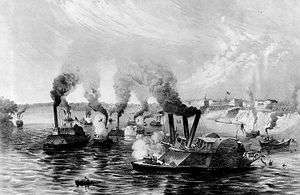CSS General Beauregard
 This contemporary print depicts the CSS General Beauregard (center right) being rammed by the USS Monarch, while other CSN ships are variously sunk, burnt, or run aground during the Battle of Memphis. | |
| History | |
|---|---|
| Name: | General Beauregard |
| Namesake: | General P.G.T. Beauregard |
| Launched: | 1847 |
| Acquired: | January 1862 |
| Commissioned: | April 1862 |
| Fate: | Sunk at action, 6 June 1862 |
| General characteristics | |
| Type: | Sidewheel steamer |
| Tonnage: | 454 long tons (461 t) |
| Propulsion: | Steam engine, side wheels |
| Armament: | 4 × 8 in (200 mm) guns |
CSS General Beauregard was a cotton-clad sidewheel ram of the Confederate Navy during the American Civil War.
Built in Algiers, Louisiana in 1847 as a towboat, the paddle steamer Ocean was selected in January 1862 by Capt. James E. Montgomery, former river steamboat master, for his River Defense Fleet. At New Orleans, on 25 January, Captain Montgomery began her conversion to a cotton-clad ram, installing 4-inch (100 mm) oak and 1-inch (25 mm) iron sheathing over her bow, with cotton bales sandwiched between double pine bulkheads to protect her boilers.
Service history
Battle of Plum Point Bend
Conversion completed on 5 April, and now renamed CSS General Beauregard, the ship steamed to Fort Pillow, Tennessee, to defend the approaches to Memphis. On 10 May 1862, General Beauregard, Capt. J. H. Hart, and seven more of Montgomery's fleet, attacked the Federal Mississippi ironclad flotilla. The Battle of Plum Point Bend witnessed effective ramming tactics by the Confederates, although General Beauregard succeeded only in keeping her four 8-inch guns bravely firing in the face of a withering hail of Union shells. Montgomery's force held off the Federal rams until Fort Pillow was safely evacuated, 4 June, then fell back on Memphis to coal, on the fifth.
Battle of Memphis
After Fort Pillow fell, Flag Officer Charles Henry Davis, USN, commanding the Mississippi River Squadron, lost no time in appearing off Memphis, on 6 June 1862. Montgomery, with a smaller squadron short of fuel, was unable to retreat to Vicksburg; unwilling to destroy his boats, he fought against heavy odds. In the ensuing Battle of Memphis, "witnessed by thousands on the bluff," Beauregard unluckily missed ramming USS Monarch and "cut away entirely the port wheel and wheel-house" of her partner, CSS General Sterling Price, also engaging Monarch. General Beauregard, backing out, gave Union flagship USS Benton a close broadside with a 42-pounder, and Benton replied with a shot into the Confederate's boiler, killing or scalding many of her crew, 14 of whom, in agony, were rescued by Benton. General Beauregard exploded and was sinking fast as Monarch captured the rest of her complement and took her in tow towards the Arkansas shore, where the wreck remained for a short time partially visible in shoal water.
References
- This article incorporates text from the public domain Dictionary of American Naval Fighting Ships. The entry can be found here.